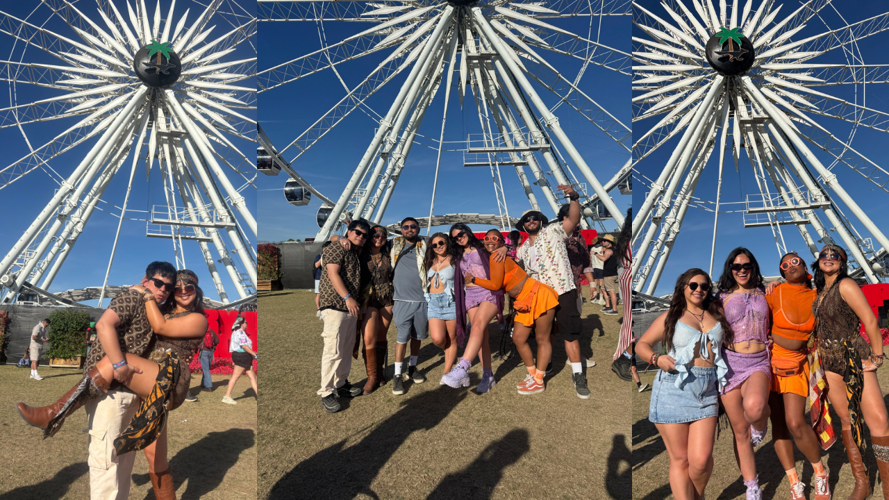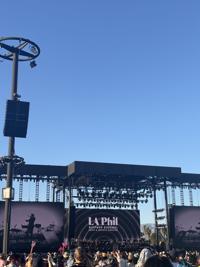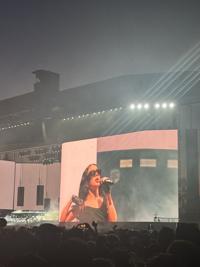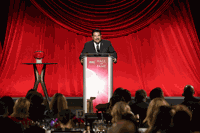
This year at Coachella, Latino artists performed all three days, including Arca, Judeline and Rawayana. The Marias and Junior H were top priority for many festival goers. Some Latinos at Coachella also added to their list the L.A. Philharmonic’s Gustavo Dudamel, Thee Sacred Souls and even Los Mirlos, the Peruvian cumbia band.
Although not Latino acts, for many Latinos, these artists were also top priority: Lady Gaga, Charli XCX, T-Pain, Megan Thee Stallion, KNEECAP, Kraftwerk and Missy Elliot.
Day 1
The first day was all about Stefani Joanne Angelina Germanotta, known and recognized as Lady Gaga.
That same day, news broke out that U.S. Senator Chris Van Hollen had travelled to El Salvador to meet with a wrongfully deported man in his district by the name of Kilmar Armando Abrego Garcia.
Even as the Trump administration ramps up their deportation efforts, for many Latino attendees to Coachella, the festival served as a moment of zen and fun.
Southern California’s Thee Sacred Souls came onstage, a band that has Black and brown members and represents the legacy of oldies soulful sounds that resonate across many Latino generations.
Then the Go-Go’s played on another stage, the iconic all-female band from Los Angeles who in the early 1980s made history as the first—and still only—female band to top the Billboard album charts by writing their own songs and playing their own instruments. Songs like “Our Lips Are Sealed” and “Vacation” still hit hard, not just as fun sing-alongs, but as reminders of how women, especially women in punk and rock, carved out space in a music industry that didn’t often make room for them. For many Latinas and queer fans in the audience, , The Go-Go’s weren’t just a nostalgic act—they were icons of liberation, defiance and fun.
Next up was the Sonora Tent curated by Pomona’s René Contreras, who has been booking the tent since 2018.
As the founder of Viva! Pomona and a champion for emerging and independent artists, René has transformed the Sonora Stage into a haven for global, punk and alternative sounds—often serving as a landing pad for acts that speak directly to the diasporas, disillusioned youth and politically conscious festivalgoers.
KNEECAP’s set started, the Belfast-based Irish rap trio who unapologetically blend Gaelic and English in their lyrics while delivering a sharp, rebellious critique of colonialism, gentrification and American imperialism.
The packed room of mostly Latino and mixed audience members, cheered, nodded and reacted to lyrics about occupation and resistance. It was a reminder that across oceans and borders, music becomes a shared language of struggle. KNEECAP’s set made it clear that for many of us, joy and resistance aren’t separate—they’re intertwined.
That’s the magic of the Sonora Tent. Whether it’s punk from South America, experimental beats from North Africa, or a surprise appearance from a political streamer, it always manages to hold space for those of us who want to dance and dissent at the same time. That is the magic of Latino music curators like René Contreras.
After the rush of KNEECAP, A.G. Cook performed at an ouside stage. Known for co-founding the PC Music label and working closely with Charli XCX, his set felt like stepping into a digital fever dream—hyperpop bliss cut with industrial breaks and a kind of rave-in-your-bedroom intimacy. For many queer fans and Gen Z kids of color, his sound is a reminder that the future of music doesn’t have to look like the past. It can be messy, glitchy and radically fun.
Eyedress followed—a dreamy, lo-fi performance that pulled us in with his signature blend of shoegaze, punk and psych-pop. Watching a Filipino artist captivate such a wide audience at Coachella made me feel like the borders of who gets to belong on a stage like this are finally breaking. There’s something about his melancholy joy, the way he performs like he’s both healing and hurting, that hits especially deep under the desert sky.
The Marías played their soft, cinematic energy was the perfect palate cleanser before what came next.
At the Sonora stage, SPEED performed, the Australian hardcore band, who turned the tent into a war zone in the best way. Bodies flying, fists in the air and a pit that felt more like a spiritual reckoning than a mosh.
Missy Elliott, as expected, was a masterclass in performance—reminding us that hip-hop has always been in conversation with queer culture, dance and futurism. It was the perfect warm-up, the kind that primes your body and spirit for something bigger.
As the lights dimmed and the opening visuals started, I looked around and noticed something that filled me with both pride and awe—almost everyone around us was Latino. Brown faces with glitter, in Dodger and Mexico jerseys, wearing homemade “Free Palestine” shirts or leather bodysuits and fishnets. People who, like us, grew up in households that may not have always understood our queerness, our art, our loudness—but who found in Gaga a kind of refuge.
Her music has long resonated with Latino audiences, not just because of the beats or the fashion, but because of the message: you were born this way, you are enough and your pain can become power. For so many queer, trans, and working-class Latinos, Gaga was the first mainstream artist who didn’t just accept us—she celebrated us. She showed us that weirdness could be sacred, that emotion could be radical and that pop could also be protest.
Her performance, already being hailed by outlets like Rolling Stone and Billboard as one of the most iconic returns to the Coachella stage in recent memory, reminded us why she remains a generational artist. Critics praised not just the precision of her vocals or the theatricality of the visuals, but the emotional range she brought to the set, balancing old hits with a raw vulnerability that felt deeply in step with where so many of us are today.
Day 2
T-Pain brought an energy that was both nostalgic and fresh. From the moment he stepped on stage, it was clear this wasn’t going to be some throwback set—it was a celebration of a legacy. His voice, still sharp and full of soul, cut through the desert heat like a party you didn’t want to end. Every song was a reminder of house parties, long drives, high school dances—and yet, surrounded by fans new and old, it felt totally present.
Mostly Latino fans were singing along to every word, dancing like the weekend had just begun. T-Pain, who’s long embraced collaboration and genre-crossing, reminded us that joy and rhythm are universal—and that sometimes, starting the day with a little autotune magic is exactly what the body needs.
In the Outdoor Theatre for a performance that was both unexpected and unforgettable: the Los Angeles Philharmonic, conducted by Gustavo Dudamel. This marked the orchestra's Coachella debut and Dudamel's final season with the L.A. Phil.
The set opened with Wagner’s “Ride of the Valkyries,” enveloping the crowd in a powerful wave of sound. The performance featured an eclectic mix of iconic orchestral pieces and surprise guest appearances, including Cynthia Erivo delivering a rousing cover of “Purple Rain.”

Gustavo doing his thing.
Meanwhile, at the main stage, Charli XCX delivered a high-energy set dominated by tracks from her highly influential album “Brat.” Experiencing such diverse performances in a single day—from the classical grandeur of the L.A. Phil to the hyperpop energy of Charli XCX—epitomizes what Coachella is all about. For us, as Latino artists and fans, this juxtaposition also reflects the multifaceted nature of our identities.
This seamless integration of different musical styles and cultures at Coachella not only enhances the festival experience but also resonates deeply with the diverse backgrounds of its attendees.
Charli XCX played at the same time as Iván Cornejo—a tough decision, especially knowing how deeply his music resonates with young Latino audiences. His songs of heartbreak and longing are the soundtrack for so many in our community, and his presence at Coachella this year was a powerful reminder of how regional Mexican music continues to evolve and claim space.
But for us, Charli was non-negotiable. Her music has shaped the way my partner Vickie and I understand performance, identity and the freedom that comes with embracing the weird, the loud and the unapologetically pop. Her impact on Latino fans isn’t always as loudly celebrated, but it’s real—especially for queer and alternative Latinos who see themselves reflected in her experimental sound and DIY ethos. Choosing Charli wasn’t choosing against Cornejo—it was choosing a different kind of healing. One is just as necessary.

Charlotte Emma Aitchison or Charli XCX.
After Charli’s electrifying set, the Outdoor Stage presented Clairo. There’s a quiet intensity to her music, a poetic restraint that says so much with so little. Watching her perform under the dusky desert sky, her music emanates the power of subtlety, of crafting emotion without spectacle.
After Charli and Clairo Green Day’s classics rang out like a time capsule of resistance and critical thought—familiar and energizing.
Then Misfits played—iconic, loud, and full of raw punk power.
In contrast, Rawayana offered a mellow tone. Their set was warm, vibey and overflowing with soul. It was the perfect cool-down to a day that had taken us through so many emotional and sonic landscapes.
Day 3
Circle Jerks had a mosh pit that called like a primal force, people lost in the rhythm, surrounded by everyone’s energy.
As the night carried on, Rema’s fusion of Afrobeats and global sounds lit up the crowd, drawing people from all corners of the festival. Rema’s popularity is undeniable, and seeing how his music crosses borders while uplifting African influences in a space like Coachella felt like witnessing a cultural shift in real time.
Junior H at Coachella was a celebration of regional Mexican music’s ongoing evolution. For many of the Latino fans in the crowd, his corridos are more than just songs—they’re stories that speak to the complexities of our shared experiences. Junior H brings a modern twist to a traditional sound, and his impact on the younger generations of Latinos, especially those navigating their identity between old and new, was clear.
Megan Thee Stallion followed, and the energy shifted immediately. Her set, full of unapologetic empowerment and swagger, was not just a performance—it was a movement. What was most striking, however, was the sea of Latina fans around us, singing every word. Megan’s music transcends race, but in that moment, it felt like she was speaking directly to Latinas who have been craving representation in rap and hip-hop for years. Her music, her confidence, her energy—so much of it resonated with our community in ways that felt personal, liberating and empowering.
From the power of Megan, the night continued to Kraftwerk, the legendary electronic pioneers whose influence on music has spanned decades. Their set was a masterclass in minimalist sound and innovation, a tribute to how art, technology, and the future are intertwined. Watching them perform in a sea of people who, too, recognized their status as icons was a reminder of Coachella's ability to pay homage to both the past and future of music.
Polo & Pan has melodic, sun-soaked rhythms that provide the perfect cool-down after the intensity of the previous sets. The French duo’s laid-back beats felt like a collective exhale, a reminder that music doesn’t always have to be fast or loud to be powerful. Their set was a reflection of the diverse musical tapestry Coachella has come to represent, offering something soothing and introspective after a day of high-energy performances.
Although Lady Gaga is not a Latina, her set wasn’t just a performance—it was a declaration, a reclamation of joy and identity, and a reminder of the power of music in tough times. There were tears in the eyes of those around us, and Latino fans in the crowd were singing every word to "Born This Way" as if it were their own anthem. Even for those who couldn’t make it to the festival, Gaga’s presence on the livestream resonated with audiences.













(0) comments
Welcome to the discussion.
Log In
Keep it Clean. Please avoid obscene, vulgar, lewd, racist or sexually-oriented language.
PLEASE TURN OFF YOUR CAPS LOCK.
Don't Threaten. Threats of harming another person will not be tolerated.
Be Truthful. Don't knowingly lie about anyone or anything.
Be Nice. No racism, sexism or any sort of -ism that is degrading to another person.
Be Proactive. Use the 'Report' link on each comment to let us know of abusive posts.
Share with Us. We'd love to hear eyewitness accounts, the history behind an article.